动词不定式的归纳
不定式知识点归纳总结
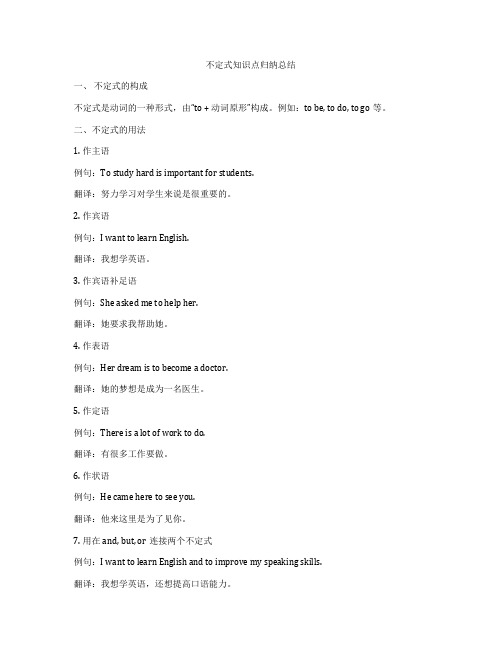
不定式知识点归纳总结一、不定式的构成不定式是动词的一种形式,由“to + 动词原形”构成。
例如:to be, to do, to go等。
二、不定式的用法1. 作主语例句:To study hard is important for students.翻译:努力学习对学生来说是很重要的。
2. 作宾语例句:I want to learn English.翻译:我想学英语。
3. 作宾语补足语例句:She asked me to help her.翻译:她要求我帮助她。
4. 作表语例句:Her dream is to become a doctor.翻译:她的梦想是成为一名医生。
5. 作定语例句:There is a lot of work to do.翻译:有很多工作要做。
6. 作状语例句:He came here to see you.翻译:他来这里是为了见你。
7. 用在and, but, or连接两个不定式例句:I want to learn English and to improve my speaking skills.翻译:我想学英语,还想提高口语能力。
8. 与形容词和副词连用例句:I'm happy to meet you.翻译:见到你我很高兴。
9. 用在名词前表示目的,结果等例句:He gave us some advice to help us study better. 翻译:他给了我们一些建议,帮助我们更好地学习。
三、不定式的特殊用法1. with + 宾语 + 不定式例句:He left me with nothing to say.翻译:他让我无话可说。
2. for + 宾语 + to 不定式例句:We have a lot of work for you to do.翻译:我们有很多工作需要你做。
3. 不定式的被动形式例句:The book is difficult to finish.翻译:这本书难以完成。
动词不定式用法归纳

动词不定式用法归纳动词不定式是一种非谓语动词形式,其结构为“to+动词原形”,其中to是其符号,它没有人称和数的变化。
动词不定式在句子中可以用作主语、表语、宾语、补足语、定语、状语等。
1、作主语· To be a doctor is hard. 做医生很难。
· To learn English well is not easy. 学好英语不容易。
· To say is to believe.眼见为实。
动词不定式(短语)作主语时,为了避免句子的头重脚轻,可以用“it”作形式主语,而把真正的主语--动词不定式(短语)放在句子的后部。
上面的句子可以改为:· It is hard to be a doctor. · It is not easy to learn English w ell. · It’s important to plant trees in spring. 如果动词不定式的动作是谁做的,可以在动词不定式前面加一个由介词for引导的短语,称为不定式的复合结构。
· It’s good for us to read English aloud in the morning. 对我们来说每天早晨大声读英语是很有益的。
· It is important for students to use English every day. 对学生来说每天使用英语是很重要的。
2、作表语在形式上,位于系动词后的就是表语。
从含义上讲,表语是回答主语“是什么”或“怎么样”的语法成分。
动词不定式(短语)作表语常用于系词be的后面。
· His work is to drive a car. 他的工作是开车。
· My job is to feed animals. 我的工作是饲养动物。
· Her ambition is to be a doctor. 她的理想是当医生。
动词不定式的基本用法归纳

动词不定式的基本用法归纳动词不定式的基本用法归纳一、动词不定时的形式肯定式:肯定式:to do sth 否定式:否定式:not to do sth. 被动式:被动式:to be done 完成式:完成式:to have done二、动词不定式的用法1.作主语A. 动词不定式作主语,谓语动词用单数形式。
动词不定式作主语,谓语动词用单数形式。
如:(1)To see is to believe. (2)To master English gives us much help in the study of sience. B. 不定式或不定式短语作主语时,常用作形不定式或不定式短语作主语时,常用it作形式主语,构成“ 形容词(+for sb.)不定式” 不定式” 式主语,构成“It is + 形容词不定式结构。
结构。
It is impossible for him to give up smoking.2.作宾语A.动词后直接不定式作宾语的动词有许多,如 .动词后直接不定式作宾语的动词有许多,want, decide, intend, fail, wish, export, pretend, choose等等。
等等。
等等I mean to go there at once. B.不定式短语作宾语时,如果还带有宾语补足语,不定式短语作宾语时,如果还带有宾语补足语,不定式短语作宾语时往往把不定式短语放在宾补之后,而用it作形式往往把不定式短语放在宾补之后,而用作形式宾语。
句型为“主语+find(feel, think, believe, 宾语。
句型为“主语consider, etc) +it+形容词名词形容词/名词形容词名词+to do sth”。
I think it necessary to report the thing to the teacher. I find it interesting to work with him.C.动词不定式还可以用作介词宾语,但仅限于 .动词不定式还可以用作介词宾语,介词except和but(除了)。
动词不定式归纳笔记

动词不定式归纳笔记动词不定式是动词的一种形式,通常由"to" + 动词的原形构成,例如"to eat"、"to study"、"to write"。
以下是一些关于动词不定式的归纳笔记:结构:动词不定式的一般结构为"to + 动词原形",例如"to go"。
在某些情况下,动词不定式也可以省略"to",例如在情态动词(can、should、will 等)后面,或者在使役动词(make、let、help 等)后面,例如"I can swim." 或"He made me laugh."用途:用于表达目的或原因,例如"I study hard to pass the exam."(我努力学习是为了通过考试。
)用于作为动词的宾语,例如"She likes to dance."(她喜欢跳舞。
)在被动语态中,不定式常用于表示被动的动作,例如"The book is to be read."(这本书应该被阅读。
)情态动词与动词不定式:情态动词(can、should、will 等)常常与动词不定式一起使用,构成复合谓语,例如"I can swim." 或"She should study more."(我会游泳。
她应该更多地学习。
)使役动词与动词不定式:使役动词(make、let、help 等)后面通常跟动词不定式,例如"Shemakes him laugh."(她让他笑。
)不定式短语:不定式也可以形成短语,例如"to go shopping"、"to play the piano",在这些短语中,不定式的功能更像是一个名词。
英语动词不定式语法知识点归纳总结

英语动词不定式语法知识点归纳总结动词不定式考向一不定式的作用1. 作主语:不定式作主语时,谓语用单数。
往往用it 作形式主语,把不定式放在谓语后面。
It took us two hours to finish the job.2. 作宾语(1)动词+不定式。
☞He managed to escape from the fire.☞I find it hard to get along with him. (it 作形式宾语)(2)动词+疑问词+to,"特殊疑问句+不定式"相当于名词,作宾语。
☞I don’t know what to do next/ how to do it next.不定式短语作宾语时,如果还带有宾语补足语,往往把不定式短语放在宾语补足语之后,用it 作形式宾语。
☞I find it necessary to learn a foreign language.3. 作宾语补足语(1)动词+宾语+不定式(to do )。
☞He warned me to be careful.注意:可以用动词不定式作宾补的动词有:ask,tell,order,want,get,would like,like,advise,invite,allowhelp,wish,warn,expect,would prefer,encourage。
(2)表见解、看法的动词结构可为:动词+宾语+ to be 的不定式结构。
☞We consider Tom to be one of the best students in our class.The book is believed to be useful.(被动语态)(3)There +不定式。
We didn’t expect there to be so many people there. 我们没料到会有那么多人在那里。
(4)在动词feel (一感),hear, listen to(二听),have, let, make(三让),notice, see, watch, observe, look at(五看)(即:吾看三室两厅一感觉)等后面的补足语中,不定式不带to,但变为被动语态后,必须带to。
动词不定式的用法总结
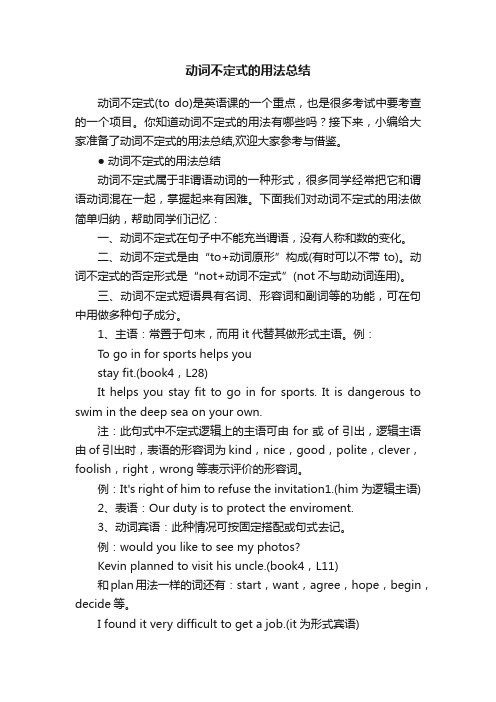
动词不定式的用法总结动词不定式(to do)是英语课的一个重点,也是很多考试中要考查的一个项目。
你知道动词不定式的用法有哪些吗?接下来,小编给大家准备了动词不定式的用法总结,欢迎大家参考与借鉴。
●动词不定式的用法总结动词不定式属于非谓语动词的一种形式,很多同学经常把它和谓语动词混在一起,掌握起来有困难。
下面我们对动词不定式的用法做简单归纳,帮助同学们记忆:一、动词不定式在句子中不能充当谓语,没有人称和数的变化。
二、动词不定式是由“to+动词原形”构成(有时可以不带to)。
动词不定式的否定形式是“not+动词不定式”(not不与助动词连用)。
三、动词不定式短语具有名词、形容词和副词等的功能,可在句中用做多种句子成分。
1、主语:常置于句末,而用it代替其做形式主语。
例:To go in for sports helps youstay fit.(book4,L28)It helps you stay fit to go in for sports. It is dangerous to swim in the deep sea on your own.注:此句式中不定式逻辑上的主语可由for或of引出,逻辑主语由of引出时,表语的形容词为kind,nice,good,polite,clever,foolish,right,wrong等表示评价的形容词。
例:It's right of him to refuse the invitation1.(him为逻辑主语)2、表语:Our duty is to protect the enviroment.3、动词宾语:此种情况可按固定搭配或句式去记。
例:would you like to see my photos?Kevin planned to visit his uncle.(book4,L11)和plan用法一样的词还有:start,want,agree,hope,begin,decide等。
动词不定式的构成与用法归纳
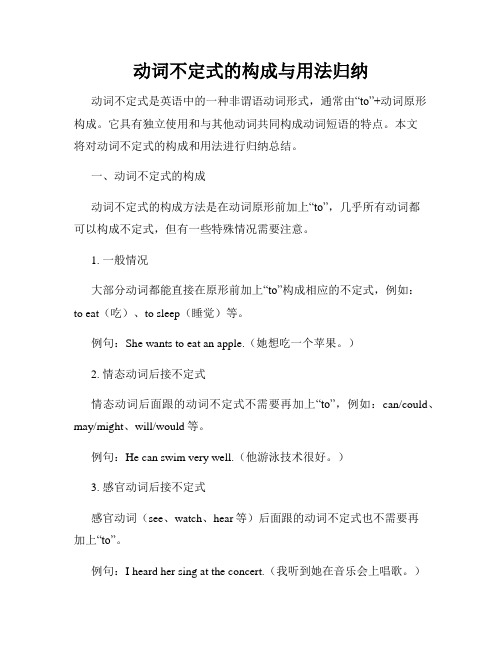
动词不定式的构成与用法归纳动词不定式是英语中的一种非谓语动词形式,通常由“to”+动词原形构成。
它具有独立使用和与其他动词共同构成动词短语的特点。
本文将对动词不定式的构成和用法进行归纳总结。
一、动词不定式的构成动词不定式的构成方法是在动词原形前加上“to”,几乎所有动词都可以构成不定式,但有一些特殊情况需要注意。
1. 一般情况大部分动词都能直接在原形前加上“to”构成相应的不定式,例如:to eat(吃)、to sleep(睡觉)等。
例句:She wants to eat an apple.(她想吃一个苹果。
)2. 情态动词后接不定式情态动词后面跟的动词不定式不需要再加上“to”,例如:can/could、may/might、will/would等。
例句:He can swim very well.(他游泳技术很好。
)3. 感官动词后接不定式感官动词(see、watch、hear等)后面跟的动词不定式也不需要再加上“to”。
例句:I heard her sing at the concert.(我听到她在音乐会上唱歌。
)二、动词不定式的用法归纳动词不定式具有多种用法,包括作主语、宾语、定语、状语以及句子的补足语等。
1. 主语动词不定式可以作为句子的主语,通常出现在句子的开头。
例句:To learn a foreign language requires patience and perseverance.(学习一门外语需要耐心和毅力。
)2. 宾语动词不定式可以作为及物动词的宾语,说明动作的对象或者接受者。
例句:I want to visit my grandparents this weekend.(我想在这个周末去拜访我的祖父母。
)3. 定语动词不定式可以作为形容词或名词的修饰语,起到进一步限定和说明的作用。
例句:This is a good book to read.(这是一本值得阅读的好书。
动词不定式的用法归纳

My question is when to start.
注意:•在与why连用时,只用于why或why not开头的简 短疑问句中,后面紧跟的动词不定式不带to。
Why not have a rest?
(9) 不定式的省略
3. 表示原因: 不定式可以用在作表语的形容词后作 状语, sorry, surprised, happy, glad, eager, angry, foolish, right, wrong, slow, quick, rude, cruel, disappointed等。
eg: I’m glad/pleased to see you. We were surprised to hear the news.
(4).独立结构作状语
To tell (you) the truth, I don’t agree with you.
类似的结构 •to be frank, •to be honest (with you), •to make things worse,
(8)不定式与疑问词who,which, when, how, what等连用,在句中起名词作用,可充当主语、 表语、宾语等。 He didn’t know what to say.
4. I don’t have time to sit around feeling sorry for myself. (attribute)
5. I am the only student in my class to have a pet snake. (attribute)
6. A big company has decided to buy it from me. (object)
高中英语知识点归纳动词不定式的用法和结构

高中英语知识点归纳动词不定式的用法和结构动词不定式是英语中的一种非谓语动词形式,由动词原形加上to构成。
它可以充当名词、形容词或副词,具有时态、语态和语气的特点。
在高中英语学习中,动词不定式的用法和结构非常重要。
本文将对其进行归纳总结。
一、动词不定式作主语动词不定式可以充当句子的主语,常见的结构有:1. It + be + 形容词 + 不定式作主语例如:- It is important to learn a foreign language.学习一门外语很重要。
- It is necessary to finish the task before deadline.在截止日期之前完成任务是必要的。
2. 不定式结构作主语例如:- To travel around the world is my dream.环游世界是我的梦想。
- To study hard is the key to success.努力学习是成功的关键。
二、动词不定式作宾语动词不定式可以作及物动词的宾语,常见的结构有:1. 动词 + 不定式作宾语例如:- I want to go shopping this weekend.这个周末我想去购物。
- She decided to take a break and relax.她决定休息一下,放松一下。
2. 常见的动词有:agree, hope, promise, refuse, plan, learn, wish等。
三、动词不定式作补语动词不定式可以作宾语补足语,常见的结构有:1. 动词 + 宾语 + 不定式作补足语例如:- They made him work overtime.他们让他加班工作。
- We find it interesting to solve puzzles.我们发现解谜很有趣。
2. 情态动词 + 动词原形作补足语例如:- He can't afford to buy a new car.他买不起新车。
动词不定式的用法及归纳
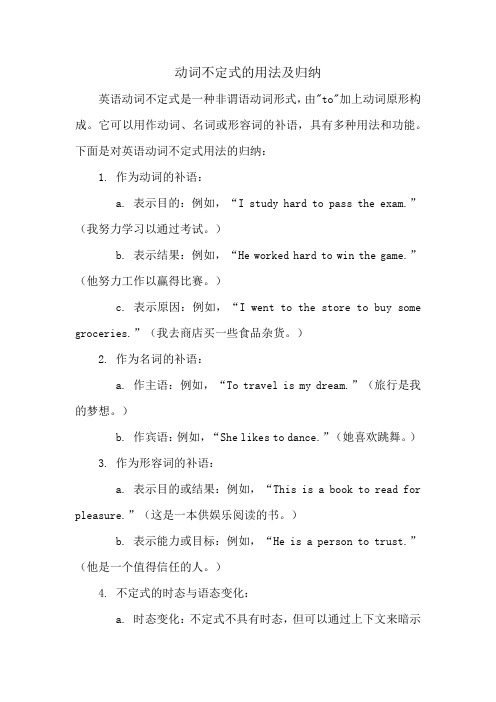
动词不定式的用法及归纳英语动词不定式是一种非谓语动词形式,由"to"加上动词原形构成。
它可以用作动词、名词或形容词的补语,具有多种用法和功能。
下面是对英语动词不定式用法的归纳:1. 作为动词的补语:a. 表示目的:例如,“I study hard to pass the exam.”(我努力学习以通过考试。
)b. 表示结果:例如,“He worked hard to win the game.”(他努力工作以赢得比赛。
)c. 表示原因:例如,“I went to the store to buy some groceries.”(我去商店买一些食品杂货。
)2. 作为名词的补语:a. 作主语:例如,“To travel is my dream.”(旅行是我的梦想。
)b. 作宾语:例如,“She likes to dance.”(她喜欢跳舞。
)3. 作为形容词的补语:a. 表示目的或结果:例如,“This is a book to read for pleasure.”(这是一本供娱乐阅读的书。
)b. 表示能力或目标:例如,“He is a person to trust.”(他是一个值得信任的人。
)4. 不定式的时态与语态变化:a. 时态变化:不定式不具有时态,但可以通过上下文来暗示时间关系。
b. 语态变化:不定式可以通过添加"be"动词的相应形式来表示被动语态。
例如,“He wants to be invited to the party.”(他希望被邀请参加派对。
)总之,不定式在句子中扮演着多种角色,并且具有多种用法和功能,具体使用取决于上下文和意图。
动词不定式用法归纳全

动词不定式用法归纳全动词不定式这玩意儿,在英语学习里可算是个“常客”啦!今天咱们就来好好把它的用法捋一捋。
先来说说啥是动词不定式。
简单说,就是“to +动词原形”的形式,比如“to do”“to play”“to study”等等。
动词不定式在句子里的角色那可多了去了。
它能当主语,比如说“To learn English well is not easy” (学好英语不容易。
)这时候,它就像个带头的老大,引领着整个句子的意思。
当宾语的时候也不含糊,像“I want to go shopping” (我想去购物。
)“want”后面跟着的“to go shopping”就是宾语,表达了我心里想做的事儿。
还有当定语的时候,比如“There is nothing to worry about” (没什么可担心的。
)“to worry about”就是用来修饰“nothing”的。
当状语的时候呢,就像“He got up early to catch the first bus” (他早起是为了赶上第一班公交车。
)这里的“to catch the first bus”就是说明了他早起的目的。
再给您说个我教学时候的事儿。
有一次上课,我讲到动词不定式当宾语补足语的用法,就举了个例子“Tell him not to play in the street”(告诉他别在街上玩。
)然后我问同学们懂了没,结果有个小调皮眨着眼睛问我:“老师,那要是他非要在街上玩咋办?”全班哄堂大笑,我也乐了,然后耐心地跟他解释:“那可不行,这不仅危险,还不符合语法规则呀!”从那以后,这个知识点同学们记得特别牢。
咱们继续说,动词不定式还有一些固定的搭配和句型,像“It's +adj + for/of sb to do sth” (对某人来说做某事是……的)“tooto” (太……而不能……)等等。
比如说“It's kind of you to help me” (你帮助我真是太好了。
动词不定式的基本用法归纳优秀课件

There will not be enough space to stand in on the earth 2、作定语的不定式与所修饰的名词之间是动宾关系, 不定式动词又是不及物动词时,应在该动词上加上 一个介词,如;
He has a nice pen to write with.
3.作表语和宾语不足语
❖ 动词不定式作表语,一是主语有不定式充当;二是 主语由抽象名词充当。
To teach is to learn. My job is to help the patient. 【注意】如果在主语中(通常在主语从句或修饰主语 的定语从句中)又实意动词do时,作表语的动词不 定式省略to。 All I want to do now (What I want to do now) is fill my stomach.
I think it necessary to report the thing to the teacher.
I find it interesting to work with him.
C.动词不定式还可以用作介词宾语,但仅限于 介词except和but(除了)。 ❖常用句型有: There is nothing to do but+动词原形 do nothing but+动词(除做….之外别无选择) can but+动词原形 (只能原形(“只有做……) have no choice but to do ,只得) cannot help/choose but+动词原形(不能不……)
动词不定式的基本用法归纳优 秀课件
一、动词不定时的形式
❖肯定式:to do sth ❖否定式:not to do sth. ❖ 被动式:to be done ❖完成式:to have done
最全面英语动词不定式的用法归纳整理总结
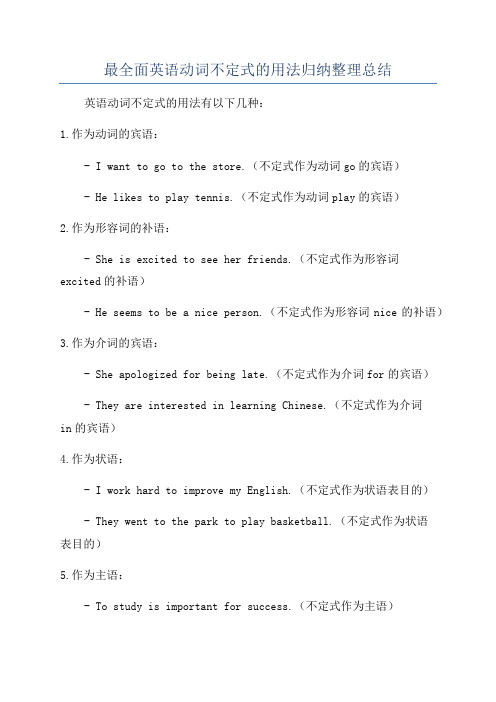
最全面英语动词不定式的用法归纳整理总结英语动词不定式的用法有以下几种:1.作为动词的宾语:- I want to go to the store.(不定式作为动词go的宾语)- He likes to play tennis.(不定式作为动词play的宾语)2.作为形容词的补语:- She is excited to see her friends.(不定式作为形容词excited的补语)- He seems to be a nice person.(不定式作为形容词nice的补语)3.作为介词的宾语:- She apologized for being late.(不定式作为介词for的宾语)- They are interested in learning Chinese.(不定式作为介词in的宾语)4.作为状语:- I work hard to improve my English.(不定式作为状语表目的)- They went to the park to play basketball.(不定式作为状语表目的)5.作为主语:- To study is important for success.(不定式作为主语)- To be or not to be, that is the question.(不定式作为主语)6.作为条件状语从句的口述形式:7.作为动词的补语:- They considered him to be the best candidate.(不定式作为动词consider的补语)- We elected her to be the team captain.(不定式作为动词elect的补语)8.作为状语从句的口述形式:- He woke up early in order to catch the train.(不定式作为状语从句的口述形式)9.作为表语:需要注意的是,不定式的肯定形式一般由to加动词原形构成,否定形式则在to后面加not构成。
动词不定式用法归纳
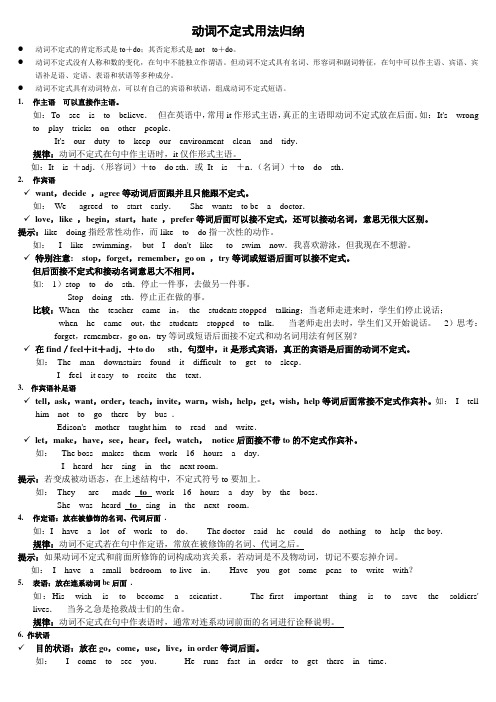
动词不定式用法归纳●动词不定式的肯定形式是to+do;其否定形式是not to+do。
●动词不定式没有人称和数的变化,在句中不能独立作谓语。
但动词不定式具有名词、形容词和副词特征,在句中可以作主语、宾语、宾语补足语、定语、表语和状语等多种成分。
●动词不定式具有动词特点,可以有自己的宾语和状语,组成动词不定式短语。
1.作主语可以直接作主语。
如:To see is to believe.但在英语中,常用it作形式主语,真正的主语即动词不定式放在后面。
如:It's wrong to play tricks on other people.It's our duty to keep our environment clean and tidy.规律:动词不定式在句中作主语时,it仅作形式主语。
如:It is +adj.(形容词)+to do sth.或It is +n.(名词)+to do sth.2.作宾语✓want,decide ,agree等动词后面跟并且只能跟不定式。
如:We agreed to start early.She wants to be a doctor.✓love,like ,begin,start,hate ,prefer等词后面可以接不定式,还可以接动名词,意思无很大区别。
提示:like doing指经常性动作,而like to do指一次性的动作。
如:I like swimming,but I don't like to swim now.我喜欢游泳,但我现在不想游。
✓特别注意: stop,forget,remember,go on ,try等词或短语后面可以接不定式。
但后面接不定式和接动名词意思大不相同。
如: 1)stop to do sth.停止一件事,去做另一件事。
Stop doing sth.停止正在做的事。
比较:When the teacher came in,the students stopped talking;当老师走进来时,学生们停止说话;when he came out,the students stopped to talk.当老师走出去时,学生们又开始说话。
动词不定式的语法总结

动词不定式的语法总结动词不定式是非谓语动词的一种形式,是英语中常见的一种语法,学生一定要做好总结,拿下这个知识点。
小编为大家力荐了动词不定式常用的语法总结,给大家作为参考,欢迎阅读!动词不定式的七种用法动词不定式的基本形式为to+动词原形.1.动词不定式做主语.谓语用第三人称单数形式.如果主语较长则用it做形式主语,将真正的主语动词不定式放到句尾.egTo see is to believe.It's a bad habit to run after dinner.2 做表语.the important things is to save lives.3 做宾语he likes to play with children.4做宾语补足语.形容词做宾补时.常用it做形式宾语.把真正的宾语放到宾补之后.he feels it happy to help others.5做定语she asked me to help her with her English.6做状语you are never too old to learn.(结果状语)7特殊疑问词+动词不定式.I am thinking about what to say.动词的不定式的用法口诀①不定式有标记,to与动词连一起。
②没有人称数变化,动词特点它具备。
③主宾定状表补语,唯独作谓不可以。
④not 加上不定式,否定结构要牢记。
⑤疑问词与不定式,构成短语有意义。
⑥仔细推敲多思考,准确判断有依据。
动词不定式专题练习1. This company was the first ____ portable radios as well as cassette tape recorders in the world.A. producingB. to produceC. having producedD. produced2. The purpose of new technology is to make life easier, ____it more difficult.A .not making B. not make C .not to make D. nor to make3. Helen had to shout ______above the sound of the music .A .making herself hear B. to make herself hearC. making herself heard D .to make herself heard4. I don’t know whether you happen_______ ,but I am going to study in the U.S.A this September.A .to be heard. B. to be bearing C .to hear D .to have heard5. The news reporters hurried to the airport, only ______the film stars had left.A .to tellB .to be toldC .tellingD .told6. You were silly not _______your car.A. to lockB. to have lockedC. lockingD. having locked7. The teacher asked us ______so much noise.A .don’t make B. not make C. not making D .not to make8. An army spokesman stressed that all the soldiers had been ordered _____clear warnings before firing any shots.A .to issue B. being issued C. to have issued D. to be issued9. I’d rather have a room of my own, however small it is, than_______ a room with someone else.A. to shareB. to have sharedC. shareD. sharing10. The bank is reported in the local newspaper_________ in broad daylight yesterday.A. robbedB. to have been robbedC. being robbedD. having been robbed11. A number of paintings in the castle are believed ________ina fire.A. being destroyedB. having been destroyedC. to be destroyedD. to have been destroyed12. The meeting _______ next week is sure to be a great success.A. to take placeB. to be taken placeC. to have taken placeD. being taken place13. As a result of my laziness, I failed ________ my work in time.A. and finishedB. to finishC. and finishingD. to finished14. I am sorry ______ written you a letter at the time.A. to have notB. to not haveC. not to haveD. not having15. Will you lend him a magazine _________?A. to be readB. for readingC. to readD. he read16. He could do nothing but _______for the bus _________.A. wait, to comeB. wait; comeC. waiting; comingD. waited; came17 .It is a problem that doesn't need ________ right now.A. to solveB. solvingC. being solvedD. to be solving18. There’s a man at the reception desk who seems very angry and I think he means _______ trouble.A. makingB. to makeC. to have madeD. having made19. I remember _______him _______the bike needed __________.A. hearing, saying, to repairB. to hear, say, to repairC. hearing, say, repairingD. to hear, saying, to be repaired20. --- You should have thanked her before you left.--- I meant _________, but when I was leaving I couldn’t find her anywhere.。
最全面英语动词不定式的用法归纳整理总结
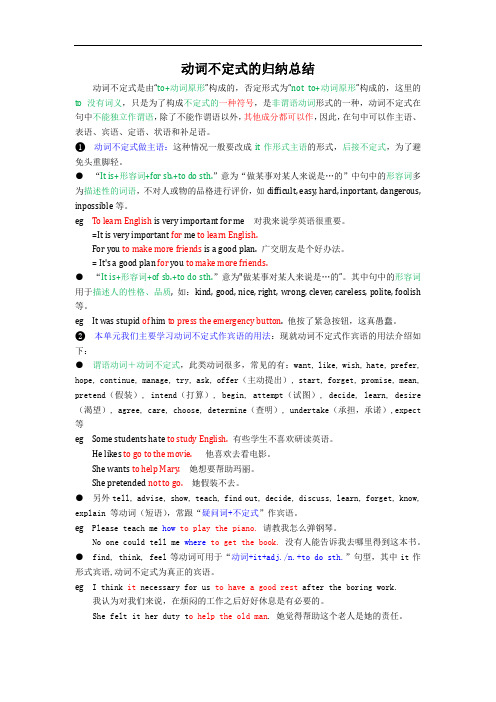
动词不定式的归纳总结动词不定式是由“to+动词原形”构成的,否定形式为“not to+动词原形”构成的,这里的to没有词义,只是为了构成不定式的一种符号,是非谓语动词形式的一种,动词不定式在句中不能独立作谓语,除了不能作谓语以外,其他成分都可以作,因此,在句中可以作主语、表语、宾语、定语、状语和补足语。
❶ 动词不定式做主语:这种情况一般要改成it作形式主语的形式,后接不定式,为了避免头重脚轻。
●“It is+形容词+for sb.+to do sth.”意为“做某事对某人来说是…的”中句中的形容词多为描述性的词语,不对人或物的品格进行评价,如difficult, easy, hard, inportant, dangerous, inpossible等。
eg To learn English is very important for me 对我来说学英语很重要。
=It is very important for me to learn English.For you to make more friends is a good plan. 广交朋友是个好办法。
= It's a good plan for you to make more friends.●“It is+形容词+of sb.+to do sth.”意为"做某事对某人来说是…的”。
其中句中的形容词用于描述人的性格、品质, 如:kind, good, nice, right, wrong, clever, careless, polite, foolish 等。
eg It was stupid of him to press the emergency button. 他按了紧急按钮,这真愚蠢。
❷ 本单元我们主要学习动词不定式作宾语的用法:现就动词不定式作宾语的用法介绍如下:●谓语动词+动词不定式,此类动词很多,常见的有:want, like, wish, hate, prefer, hope, continue, manage, try, ask, offer(主动提出), start, forget, promise, mean, pretend(假装), intend(打算), begin, attempt(试图), decide, learn, desire (渴望), agree, care, choose, determine(查明), undertake(承担,承诺),expect 等eg Some students hate to study English. 有些学生不喜欢研读英语。
动词不定式要点归纳
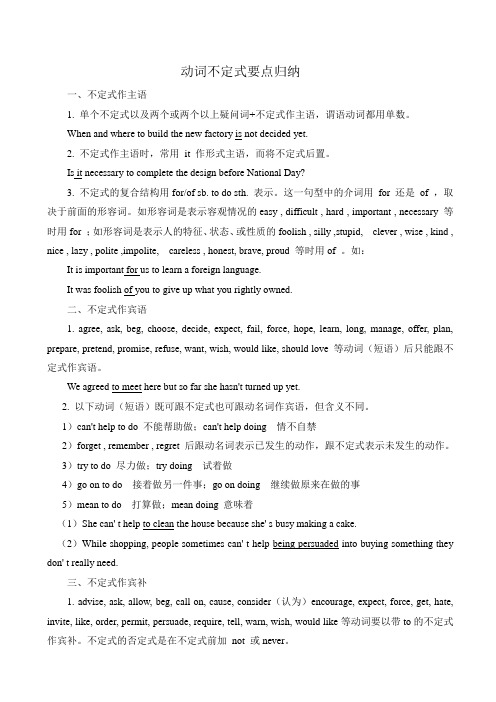
动词不定式要点归纳一、不定式作主语1. 单个不定式以及两个或两个以上疑问词+不定式作主语,谓语动词都用单数。
When and where to build the new factory is not decided yet.2. 不定式作主语时,常用it 作形式主语,而将不定式后置。
Is it necessary to complete the design before National Day?3. 不定式的复合结构用for/of sb. to do sth. 表示。
这一句型中的介词用for 还是of ,取决于前面的形容词。
如形容词是表示容观情况的easy , difficult , hard , important , necessary 等时用for ;如形容词是表示人的特征、状态、或性质的foolish , silly ,stupid, clever , wise , kind , nice , lazy , polite ,impolite, careless , honest, brave, proud 等时用of 。
如:It is important for us to learn a foreign language.It was foolish of you to give up what you rightly owned.二、不定式作宾语1. agree, ask, beg, choose, decide, expect, fail, force, hope, learn, long, manage, offer, plan, prepare, pretend, promise, refuse, want, wish, would like, should love 等动词(短语)后只能跟不定式作宾语。
We agreed to meet here but so far she hasn't turned up yet.2. 以下动词(短语)既可跟不定式也可跟动名词作宾语,但含义不同。
高中英语知识点归纳动词的不定式
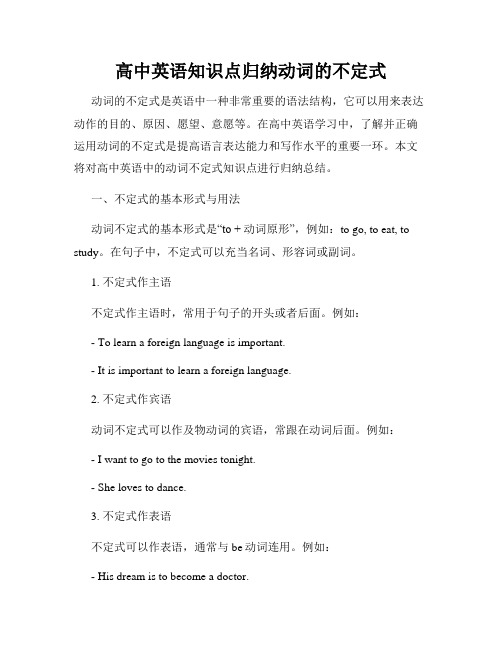
高中英语知识点归纳动词的不定式动词的不定式是英语中一种非常重要的语法结构,它可以用来表达动作的目的、原因、愿望、意愿等。
在高中英语学习中,了解并正确运用动词的不定式是提高语言表达能力和写作水平的重要一环。
本文将对高中英语中的动词不定式知识点进行归纳总结。
一、不定式的基本形式与用法动词不定式的基本形式是“to + 动词原形”,例如:to go, to eat, to study。
在句子中,不定式可以充当名词、形容词或副词。
1. 不定式作主语不定式作主语时,常用于句子的开头或者后面。
例如:- To learn a foreign language is important.- It is important to learn a foreign language.2. 不定式作宾语动词不定式可以作及物动词的宾语,常跟在动词后面。
例如:- I want to go to the movies tonight.- She loves to dance.3. 不定式作表语不定式可以作表语,通常与be动词连用。
例如:- His dream is to become a doctor.4. 不定式作定语动词不定式可以修饰名词,充当名词的定语。
例如:- She has a book to read.5. 不定式作状语动词不定式可以作状语,修饰动词、形容词或副词,表达动作的目的、原因、结果等。
例如:- He went to the store to buy some groceries.(目的)- She is too young to watch that movie.(结果)二、动词不定式的时态与语态动词不定式有时态和语态的变化,主要包括一般式、进行式、完成式和被动式。
1. 一般式一般式表示动作或状态的普遍性、一般性。
例如:- I like to play basketball.2. 进行式进行式表示动作正在进行。
动词不定式语法总结

动词不定式语法总结动词不定式是英语中的一种特殊形式,由“to + 动词原形”构成。
它在句子中可以充当名词、形容词或副词,具有多种用法和功能。
本文将对动词不定式的语法进行总结和归纳。
一、动词不定式作主语动词不定式可以作为句子的主语,常用结构为“动词不定式+ 谓语”。
例如:“To learn a foreign language is beneficial for personal development.”(学习一门外语对个人发展是有益的)。
“To travel is my dream.”(旅行是我的梦想)。
二、动词不定式作宾语1. 动词不定式作及物动词的宾语,常用结构为“动词+ 动词不定式”。
例如:“I want to learn how to play the guitar.”(我想学弹吉他)。
“She promised to help me with my homework.”(她答应帮我做作业)。
2. 动词不定式作介词的宾语,常用结构为“介词 + 动词不定式”。
例如:“I am good at playing basketball.”(我擅长打篮球)。
“He is interested in learning about different cultures.”(他对了解不同文化很感兴趣)。
三、动词不定式作表语动词不定式可以作为句子的表语,常用结构为“主语+ 系动词+动词不定式”。
例如:“Her dream is to become a doctor.”(她的梦想是成为一名医生)。
“His goal is to win the championship.”(他的目标是赢得冠军)。
四、动词不定式作定语动词不定式可以作为句子中名词的定语,常用结构为“名词+ 动词不定式”。
例如:“I have a book to read.”(我有一本书要读)。
“She has a meeting to attend.”(她有一个会议要参加)。
第十二章动词不定式(思维导图+知识梳理+好题精炼)2022-2023初中英语中考语法归纳

第十二章动词不定式思维导图知识梳理一、不定式概述动词不定式的基本形式是:“t o+动词原形”,有时可以不带to.不带to的不定式与动词原形同形,但它不是原形,而是一种语法形式.除基本助动词do和情态动词外,英语动词都有不定式形式.动词不定式没有人称和数的变化,在句子中不能作谓语,但可以担任除谓语外的任何成分-主语、表语、宾语、定语、状语和宾语补足语.动词不定式和它的宾语或状语构成不定式短语.不定式有时态、语态变化(以do为例):主动语态被动语态一般式to do to be done进行式to be doing -完成式to have done to have been done 完成进行式to have been doing -(一)作主语用作主语的动词不定式通常表示一种具体的、特定的行为,其谓语动词用第三人称单数形式.To obey the laws is everyone's duty.服从法律是每个人的职责.How to use the computer is a question.怎么使用计算机是一个问题.How to get there is not decided yet.怎样去那里还没决定下来.点拨(1)在很多情况下,常用it作形式主语,而把真实主语不定式放在谓语之后.It was difficult to sell my car.我的车很难卖掉.It's not known where to stay for the night.在哪里过夜还不知道.(2)如果要表示不定式的动作是谁做的,一般在不定式前加一个for短语.It will be a regret for us not to help him.我们没有帮助他是个遗憾.(3)在某些形容词(如kind, good, nice, wise, unwise, clever, silly, wrong, right, foolish, stupid, careless, considerate, rude, naughty, impolite等)作表语时,不定式前常可加一个以of引起的短语,来说明不定式指的是谁的情况.It would be rude of us to refuse their invitation.(我们)拒绝他们的邀请,会显得无礼.(二)作表语作表语,一般紧跟在系动词,如:be, seem, get等后面,用以说明主语.The question is when to start.问题是什么时候启程.You seem to have lost weight.你好像减肥了.What we have to do first is to find a solution.我们得做的第一件事是找出一个解决办法.点拨当不定式所作的表语仅用来说明主语的内容时,这个不定式只作单纯的表语,而不具有未来的含义.(三)作宾语能以不定式作宾语的动词很多,常见的有:agree, begin, decide, expect, forget, hope, learn, like, manage, pretend, start, try, want, wish等.Do you wish to see the manager?你想见经理吗?They decided to learn English hard.他们决定好好学英语.Don't forget to meet me at 6:00.别忘了六点钟和我见面.有些动词,如:tell, advise, show, teach, know, forget, learn , remember, show,understand, see, wonder, hear, find out, explain, decide, discuss等后面,常用带疑问词的不定式作宾语.We don't know who(whom)to ask.我们不知道问谁.We asked how to get to the station.我们问怎么到达车站.Have you decided where to go for your holidays?你们决定到哪儿度假了吗?I don't know whether to apply for the job or not?那份工作我不知道申请还是不申请?(四)作定语I have no time to waste.我没有时间可浪费.Let me find a place to park.我来找个停车的地方.He is always the first to come to work and the last to leave.他总是第一个来上班,最后一个走.点拨不定式修饰something, anything, nothing时,放在它们的后面.如果something, anything, nothing 有形容词来修饰,词序是something(nothing...)+形容词+不定式.My father had something to do.我父亲有事要办.Have you got anything important to buy?你有什么重要的东西要买吗?(五)作状语不定式常可用作状语,修饰动词,表示行为的目的、结果、原因等.一般放在被修饰词之后,但在表示目的时,为了强调也可放在句首.1.作目的状语为加强语气在否定式前还可加上in order或so as组成词组(即:in order to...,so as to...),作状语表示目的.To live a long and healthy life, we must learn to have a balanced diet.为了能过长寿而健康的生活,我们必须懂得吃均衡的食品.I stayed there so as to see what would happen.我留在那儿,为的是想看看会发生什么事.In order to help him, we would do everything we can.为了帮助他,我们愿意尽一切力量.2.作结果状语表结果,其逻辑主语通常亦是全句的主语.在“so...as to...”“such...as to..“enough to...”“only to...”以及“too...to...”等结构中的不定式皆表示结果.She is old enough to go to school.她已到了可以上学的年龄了.He was too drunk to drive home.他酩酊大醉,没法开车回家.3.作原因状语She trembled to think of the terrible accident.想到那可怕的车祸,她就不寒而栗.We jumped with joy to hear the news.听到这消息,我们都高兴地跳了起来.(六)宾语补足语1、有很多动词的后面都可以有不定式作宾语补足语常见的这类动词有:advise, ask, tell, help, wish, want, expect, forbid, persuade, press, request, teach, warn等.She asked her grandfather to play game with her.她请爷爷跟她一起做游戏.Mother told me to cook the meal.妈妈叫我做饭.2.有一些动词后用作宾语补足语的不定式通常不带to,这种动词有两类:一类是感觉动词,另一类是使役动词感觉动词:如feel, see, hear, watch, notice等.使役动词:如make, let, have等.Let me do it for you.让我来替你做.Don't let her go out.别让她出去.I made him work hard.我迫使他加劲干.(1)动词help之后,复合宾语中的不定式可带to,亦可不带to.在上述动词转换为被动结构时,其后的不定式必须带to.He was seen to enter the theatre.有人看见他走进了剧院.I was made to do my homework the whole night.我被迫整晚做作业.Can you help me (to) move this table?你能帮我移动一下这张桌子吗?(2)感官动词的宾语补足语有两种形式:不带to的不定式和动词-ing形式.I heard Meimei singing in her room when I went past.我路过的时候听见梅梅在房间里唱歌.(路过的瞬间正在唱,所以用singing)We often hear Meimei sing in her room.我们经常听见梅梅在房间里唱歌.(经常听见,用不定式)I saw him come in.I saw him coming in.两句话的意思都一样:我看见他进来.用不定式着重于动作的全过程,用动词-ing形式则是强调当时动作的进行情况.3.当谓语动词为think, make, find, consider, feel, regard等词,作宾语的不定式后面有宾语补足语时,常用it作形式宾语,而将真正的宾语放在补足语的后面I find it easy to learn English well.我发现要把英语学好很容易.三、不定式的主要句型及注意事项(一)不定式的否定式不定式的否定式:not+不定式,经常和ask(tell)sb. to do sth.句型连用.She asked me not to drive him to the station.她要我不要开车送他到车站.Try not to be late.争取不要迟到.Mary asked me not to give my pen to Jimmy.玛丽让我别把笔给吉米.She decided not to come here again.她决定不再到这儿来.点拨不定式的否定式和否定句的区别:I asked him not to open the door.我让他别把门打开.I didn't ask him to open the door.我没让他把门打开.(二)不定式的进行时态进行式:表示在谓语动词所表示的动作或状态发生时正在进行.It's nice to be sitting here with you.在这儿陪你坐着是非常愉快的.It is unwise for him to be talking that topic all the time.他老是谈论这件事,很不明智.(三)不定式的完成时态完成式表示在谓语动词的动作或状态发生时已经完成.She said she was sorry to have missed you.她说她没见到你很遗憾.He seemed to have visited our factory.他好像参观过我们的工厂.They appeared to have met before.他们看来以前见过面.(四)动词不定式的被动语态表示被动意义I didn't want to be told about it.我不想被告知这件事.Nothing seems to have been forgotten.似乎什么也没有被遗忘.The building is said to have been destroyed in a fire two years ago.据说这幢大楼两年前已毁于一场大火.在以某些形容词,如kind, good, silly, honest, bad, stupid, bold, clever, cruel,courteous, nice, rude, sensible, tactful, wise, wrong等作表语时,后面需用以“of+名词(或代词宾格)+不定式”结构,以说明不定式所表示的动作的执行者是谁(即of短语是不定式的逻辑主语).It's very good of you to come.谢谢你的光临.How silly of you (it is)to make such a mistake!你出了这样的差错,多傻啊!It's very kind of you to say so.多谢你这么说.在had better, had best, would rather, would rather...than, would sooner, would sooner...than, cannot but, do nothing but等结构后面的不定式要省略“to”.You had better write it in English.你最好用英文写.I would rather stay at home.我宁愿待在家里.好题精练一、用-ing形式或不定式的适当形式完成句子1.Do you enjoy_________ football?(play)2.Fred didn't have any money, so he decided_________ a job.(take)3.We're going out for dinner, Would you like_________ us?(join)4.The teacher reminded the students_________ their test paper on time.(finish)5.When I was tired, I enjoyed_________ TV.(watch)6.It was a nice day, so the old man agreed_________ for a walk.(go)7.I'm not in a hurry, I don't mind_________.(wait)答案:1.playing2.to take3.to join4.to finish5.watching6.to go7.waiting二、选择括号内所给词组完成句子,注意括号内“go+v.-ing形式”构成固定搭配的用法(go boating; go fishing; go dancing; go running; go skating; go hunting; go singing)1.She's a good dancer. She always_________ on Saturday.2.I've got a gun. I'll_________ with that strong hunter next weekend.3.“Where is Tim?”“He has. _________ He always runs in the morning.”4.We have enough fish to eat. Our father_________ every day.答案:1.goes dancing2.go hunting3.gone running4.goes fishing三、仿照示例改写下列句子示例:It is very interesting to play baseball.→ To play baseball is very interesting.1.lt was not polite to speak that way before Mr. Lee.___________________________________________________________________________________________ _2.It can be quite easy to travel by air.___________________________________________________________________________________________ _3.lt will be no problem to arrive there before noon.___________________________________________________________________________________________ _4.To make those strangers believe us was so difficult.___________________________________________________________________________________________ _5.To help Tom speak Chinese well is not at all easy.___________________________________________________________________________________________ _答案:1.To speak that way before Mr. Lee was not polite.2.To travel by air can be quite easy.3.To arrive there before noon will be no problem.4.It was so difficult to make those strangers believe us.5.It is not at all easy to help Tom (to) speak Chinese well.四、选择填空1. _________ the bookstore, he stopped_________ a few books.A. Passing; buyingB. Passing; to buyC. To pass; buyingD. Having passed; to buy2.Bruce,look at your dirty shoes, You'd better_________ them right now.A. washedB. washingC. washD. to wash3. _________ the room, I found the computer_________.A. Entering; stealingB. Entering; stolenC. To enter; stealD. To enter; stealing4.We've worked hard for nearly one hour. Let's stop_________ a rest now.A. haveB. to haveC. havingD. have had5.My mother always tells me not_________ to the net bars(网吧).A. goB. to goC. goesD. going6.The teacher asked us_________ English for half an hour in the morning.A. reads B reading C. to read D. read7.You will have to get up early tomorrow. Stop_________ TV, Peter.A. watchesB. watchC. to watchD. watching8.I find it hard_________ English well.A. learnB. learningC. to learnD. learns9.The teacher asked John_________ a short talk in our class meeting.A. giveB. to giveC. gaveD. giving10.The girl was too poor_________ a houseA. to buy; to live inB. to buy ;to liveC. buy; to liveD. buying; living in11.It was very late at night, but Mr. Brown still went on_________.A. works B .worked C. working D. work12.Remember_________ him about it before he goes away.A. tellB. to tellC. tellingD. to telling13.Lin Tao is strong enough_________ the big box.A. carryB. to carryC. carryingD. carries14.Her mother told her_________ in bed.A. not readB. not to readC. don't readD. to not read15.When class began, we stopped_________ to the teacher carefully.A. listeningB. listenC. listens D .to listen16.You'd better_________ the cinema by bus.A. don't goB. to goC. to go toD. go to17.What did the manager_________ you to_________ at the meeting?A. tell; sayB. ask; speakC. tell; speakD. ask; talk18.Tom was let_________ in the gate house.A. waitB. to waitC. waitingD. to have waited19.Mr.Hu has enough time_________ the job in two days.A. finishB. to finishC. finishingD. finished20.Look,the building_________ is our library.A. is repairedB. being repairedC. repairingD. to be repairing21. _________ no money, I could not buy this coat.A. HaveB. HavingC. To haveD. Have had22.The teacher has something important_________ us.A. to tellB. tellsC. tellingD. told23.Li Ming didn't know_________ next.A. to do whatB. what to doC. how to doD. what do24.I'd love_________ to your birthday party.A. comeB. cameC. to comeD. comes25.It took me two hours_________ by bus.A. to get thereB. to get to thereC. get thereD. get to there答案:1-5BCBBB 6-10CDCBA11-15CBBBD 16-20DABBB21-25 BABCA五、改正下列句子的错误1.He seems to not hear from her.___________________________________________________________________________________________ _2.I hope see you soon.___________________________________________________________________________________________ _3.I made them to give the money back.___________________________________________________________________________________________ _4.The scientist gave us some advice on how learning English.___________________________________________________________________________________________ _5.No one noticed him to leave the room.___________________________________________________________________________________________ _6.Have you given up to smoke?___________________________________________________________________________________________ _7.We found him waited at the school gate.___________________________________________________________________________________________ _8.Why not to turn off the light?___________________________________________________________________________________________ _9.She didn't want me go.___________________________________________________________________________________________ _10.I don't know to swim.___________________________________________________________________________________________ _11.China is a developed country belonging to the third world.___________________________________________________________________________________________ _12.It's getting dark. We have to find a hotel to live.___________________________________________________________________________________________ _13.He said he had an important meeting to attended.___________________________________________________________________________________________ _14.They don't allow that people smoke.___________________________________________________________________________________________ _15.It's difficult sell my car.___________________________________________________________________________________________ _答案:1.He seems not to...2.I hope to see...3.I made them give...4....how to learn...5....him leave...6....given up smoking?7...him waiting...8.Why not turn off...9.She didn't want me to go.10.I don't know how to swim.11....a developing...12....to live in13....to attend.14. ...people to smoke.15...to sell my car.。
- 1、下载文档前请自行甄别文档内容的完整性,平台不提供额外的编辑、内容补充、找答案等附加服务。
- 2、"仅部分预览"的文档,不可在线预览部分如存在完整性等问题,可反馈申请退款(可完整预览的文档不适用该条件!)。
- 3、如文档侵犯您的权益,请联系客服反馈,我们会尽快为您处理(人工客服工作时间:9:00-18:30)。
动词不定式的归纳编写Johnplay Saturday, November 23, 2013动词不定式由to +动词原形组成,在句子中具有名词、形容词和副词的特征,因此在句中可以作主语、表语、宾语、定语、状语、宾补。
㈠不定式作主语动词不定式在作主语时,用法主要有以下几种:⑴动词不定式作主语时,常用it作形式主语,而往往将动词不定式放在谓语或表语之后。
如:①It's not easy to learn a foreign language well.=To learn a foreign language well is not easy.学好一门外语不容易。
②It is dangerous To lean out of the window=To lean out of the window is dangerous.身子探出窗外很危险。
⑵ It takes sb+some time+to do用it作形式主语,把真正的主语不定式置于句后。
如:①How long did it take you to finish the work? 你花了多少时间来完成这项工作吗?②It will take us half an hour to get there by bike 我们骑自行车到那里将要花半小时。
⑶It+be+形容词+for sb+to do,常用表示客观情况的形容词,如:difficult, easy, hard, important, impossible, necessary等.①It's difficult for us to finish the work. 对我们来说,完成这项工作很困难。
②It's hard for me to answer your question. 要我回答你的问题很难。
⑷It+be+形容词+of+ sb+to do常用careless, clever, good, foolish, honest, kind, lazy, nice, right, silly, stupid, wise等描述行为者的性格、品质的形容词,则应在不定式前加一个of引起的短语。
☻注意:在of sb.结构中,可用sb.直接作句子的主语来改写。
试比较:①It's foolish of him to go alone. (=He was foolish to go alone.) 他单独出去太傻了。
②It's kind of you to give me the book. (=You are kind to give me the book.)你给我这本书,真是太好了。
⑸It seems(appears)+形容词+to doIt seemed impossible to save money. 现在好像不可能存钱。
⑹It+be+名词+to doIt's our duty to take good care of the old.照顾老人是我们的责任。
⑺不定式的完成式也可作句子的主语①To have made the same mistake twice was unforgivable.两次犯同样的错误是不可原谅的。
②It is better to have loved and lost than never to have loved at all.爱过而后失去了爱,比从未爱过要好。
⑻疑问词who,which,when,where,what等常与不定式连用,在句中起名词作用,可充当主语、宾语、表语等。
①How to solve the problem is very important.(主语) 如何解决这一问题很重要。
②He didn’t know what to ask.(宾语) 他不知道该问些什么。
③ My question is when to start.(表语) 我的问题是何时开始。
㈡不定式作表语☻不定式可放在be动词后面,形成表语,如:sb+ is to do sth。
如:①My work is to clean the room every day. 我的工作是每天清扫房间。
②His dream is to be a doctor.他的梦想是成为一名医生。
☻可用主动形式表示被动含义的结构有to blame, to let.①Who is to blame? 谁该受到责备?②The house is to let. 该房屋出租。
③Suspects are still to find out. 凶手还有待查明。
㈢不定式作宾语⑴不定式做宾语时须注意:不定式并不是可做任何及物动词的宾语。
能接不定式做宾语的动词有:afford付得起,agree同意,appear显得,arrange安排,ask要求,attempt试图,choose决定,claim声称,condescend屈尊,consent准许,decide决定,demand要求,determine决心,endeavor 竭力,expect期待,fail未履行,help帮助,hesitate犹豫,hope希望,learn学会,manage设法,neglect 疏忽,offer主动提出,plan计划,prepare准备,pretend假装,proceed接着做,promise答应,prove 证明,refuse拒绝,resolve解决,seem觉得好像,swear发誓,tend往往会,threaten预示,undertake 承诺,volunteer自愿做,vow发誓,want想要,wish希望,等。
如:①She managed to avoid an accident. 她设法避免了一次事故。
②I can’t afford to buy such an expensive computer. 我买不起这么昂贵的电脑。
③He pretended not to know the facts. 他佯装不知实情⑵做宾语的不定式如果带有自己的补足语,则须用it做形式宾语,而将真正的宾语置于补足语之后,即:主语+动词+it+补语+to do句式。
如:Do you think it necessary to master a foreign language? 你认为掌握一门外语有必要吗?I find it interesting to stay with you. 我发觉与你呆在一起很有趣。
⑶动词+疑问词+不定式,这类动词常见的有:tell, advise, show, teach, find out, decide, discuss, learn, forget, inquire, know, explain, remember, see, understand, wonder等。
如:①Please show us how to do that. 请演示给我们如何去做。
②There are so many kinds of tape-recorders on sale that I can't make up my mind which to buy.有这么多的录音机,我都拿不定主意买哪一种。
㈣不定式作宾语补语☻不定式作宾语的补足语须从二个方面来掌握。
⑴动词接动词不定式做宾语的补足语时,不定式的to不能省略。
这样的动词有:advise, allow, ask, beg, cause, encourage, expect, force, forbid, get, help, order, permit, persuade, require, teach, tell, want, wish, warn, call on, wait for, long for。
如:①The teacher advised us to learn through experiment. 老师劝我们通过实验来学习。
②They didn’t allow us to enter the hall. 他们不允许我们进入大厅。
⑵常接不带to的不定式作宾语补足语的动词或短语有:一感(feel),二听(hear,listen to),三让(have,let,make),五看(look at,notice,observe,see,watch)但是这些句子变成被动语态时,需带上to ①主动:The boss made the workers work over ten hours a day in the past.→被动:The workers were made to work over ten hours a day by the boss.过去老板使工人们每天工作十多个小时。
②主动:I saw Li Lei fall down from his bike.→被动:Li Lei was seen to fall down from his bike.我看见李蕾从单车上摔了下来。
☻注意:help后的宾语补足语可以带to也可以不带to。
如:He often comes to help us (to) do some farming work. 他经常来帮我们干农活。
㈤不定式作定语动词不定式作定语需后置,与所修饰的词有主谓或动宾关系。
①When the question was out,he was the first one to raise his hand.问题一提出,他第一个举手。
②This terrorist attack is a lesson to remember. 这次恐怖袭击事件是个应该记取的教训。
③I am afraid I cannot attend your party,for I have too many things to do.恐怕我不能参加你的晚会了,因为我有好多事情要做。
注意:☻当被修饰的是不定代词.如:everything, anything, much, little等,或被修饰的名词前被形容词最高级,序数词,the only等强调结构修饰时,非谓语动词作定语则只能用动词不定式。
He was the last to realize the importance of this problem. 他没有及时意识到问题的重要性。
☻如被修饰的名词或代词是动词不定式的逻辑宾语,且动词不定式的动词是不及物动词,则后面需跟成为搭配的介词。
①Who is the man to talk to? 要谈话的人是谁?②I need a pen to write with.我需要一支笔写字③He is a tough teacher to deal with.他是个很难对付的老师。
